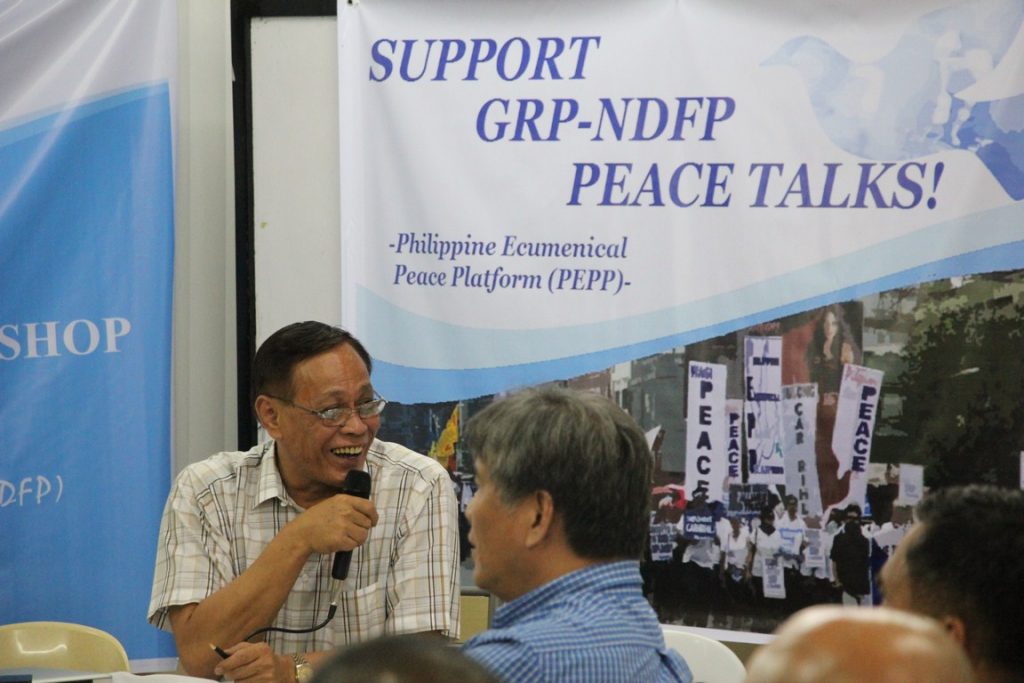CAGAYAN DE ORO CITY – The government (GRP) negotiating panel for talks with the National Democratic Front (NDF) has reiterated the importance of having a broad and strong public support with regard achieving a final peace agreement with the communist insurgents, citing specific areas where civil society can help.
“If we succeed in building a constituency which manifests the true will of the people, can two sides say no to that strong public voice?” explained Atty. Efren Moncupa, chair of the GRP Monitoring Committee on the Comprehensive Agreement on Respect of Human Rights and International Humanitarian Law (CARHRIHL).
Moncupa, who spoke yesterday before members of faith-based network Philippine Ecumenical Peace Platform here in the city, asked the help of civil society in building peace constituents from different sectors by initiating consultations with their concerned sectors.

“We want to talk to different sectors. You can consult your people – Lumads, women, youth, etc. – so we can arrive in a national consensus or agenda… Consultations must be institutionalized to lay the foundation on building constituents supportive to the process,” he emphasized.
Government Implementing Panel for the Bangsamoro Accords Chairperson Irene Santiago has earlier also stated plans for creating spaces that will allow public participation in the implementation of the signed Bangsamoro peace agreements as a direct response to the directives of President Rodrigo Roa Duterte for an inclusive peace process.
Role of CSOs in GRP-NDF talks
Aside from constituency building, Moncupa also identified four areas where members of the civil society can actively participate in the current GRP-NDF peace talks including: serving as a bridge between the GRP and NDF in arriving a common ground towards a final political settlement; generating options to resolve contentious issues such as the ongoing discussions on social and economic reforms; keeping both parties committed in lowering the level of violence in the ground; and helping in addressing the roots of armed conflicts.
“The difference now is that the peace talks is in public discourse. It is the only time that we have reciprocity in our outlook. The prospect is good yet it is challenging,” Moncupa reminded. “We must make this peace works, otherwise we do not have any other options left,” he concluded.
Around 500 peace advocates and practitioners gathered recently in Davao City, together with various government agencies such as the Office of the Presidential Adviser on the Peace Process (OPAPP) and the National Commission on Muslim Filipinos (NCMF), to engage in a dialogue on local governments’ and civil society’s pivotal role in achieving a just and sustainable peace across the country.
“We need you here: to represent the people from your community, and in turn, when you go back to your communities, to represent us. You echo the concerns of our marginalized and underprivileged sectors, in the same way that you cascade our messages to the communities war-torn and scarred as they are by long-standing conflicts,” said OPAPP Undersecretary Nabil Tan during the gathering, reiterating that the cornerstone of the peace roadmap is the fundamental dialogue between the government and the Filipino people.
“We call on everyone to get on board and participate in their own small but meaningful way. We want to initiate public conversations with different stakeholders. We may not all obtain the opportunity to sit at the negotiating tables, but we can be in the sidelines: pitching our ideas, sharing our concerns in the best constructive and democratic tradition.”











